WASHINGTON: Abortion, gun rights, religious freedoms and potentially race: the US Supreme Court began a new term yesterday with blockbuster cases on its docket that could spotlight the influence of conservative justices chosen by Donald Trump. For the first time in 18 months, the court's justices will be back on the bench in person - although one member, Justice Brett Kavanaugh, recently tested positive for COVID-19 and will participate remotely. Kavanaugh is one of the three justices confirmed to the court during Republican Trump's four-year presidency, which shifted the court to a solidly conservative 6-3 majority.
Last year, this reorganized court asserted its independence, however, notably rejecting Trump's crusade to invalidate the 2020 election results that saw him defeated by Joe Biden. But in such "shadow" cases - the nickname for expedited rulings that are not debated in public - the court has begun a rightward tilt, highlighted by its September 1 decision to not block a Texas law that bans almost all abortions in the state. The ruling enraged Democrats, including President Biden, and renewed calls for Supreme Court reforms that are being considered by a presidential commission studying options including adding seats to the bench.
More broadly, public frustration with the court has grown: only 40 percent of Americans now say they appreciate its work, compared to 49 percent in July, while 37 percent of respondents consider it "too conservative," according to a Gallup poll. In a sign of the tumult, abortion rights defenders protested outside Kavanaugh's home, and on Saturday thousands of people converged on the Supreme Court -- and in cities across America - proclaiming abortion as a personal choice and not a legal debate.
'Partisan hacks'
To calm the waters, the justices have gone to great lengths recently to convince the public of their impartiality. "This court is not comprised of a bunch of partisan hacks," Amy Coney Barrett, the justice who succeeded the late liberal icon Ruth Bader Ginsburg, said in a speech to students in Kentucky. Critics were quick to note that her remarks were made in the presence of top Republican Senator Mitch McConnell, who presided over Barrett's hasty confirmation near the end of the 2020 presidential campaign. Beyond the speeches, the 2021-2022 session "will prove to be a real test whether or not the Supreme Court can rise above the partisan divide," said David Cole, national legal director for civil liberties defender ACLU.
On the courts agenda? Essentially the key social issues that most divide Americans, starting with the sensitive subject of abortion. Beginning December 1, the justices will consider a Mississippi law that bans abortions after 15 weeks of pregnancy. The law's supporters see the case as an opportunity to overturn Roe v. Wade, the landmark 1973 decision which established the constitutional guarantee of abortion rights.
During his 2016 campaign, "Donald Trump promised to appoint justices who would overrule Roe versus Wade," Amy Howe, editor of the court-focused website SCOTUSblog, recalled recently. With his appointment of justices Neil Gorsuch, Kavanaugh and Barrett, "now is the time to see whether or not that promise will come true," she said during a talk at Washington think tank the Cato Institute.
'Juicy cases'
Another explosive issue on tap is the carrying of firearms. Until now, the court has held that Americans have a constitutional right to bear arms at home for self-defense, but it has said nothing about how much protection the Second Amendment affords people who carry a concealed firearm in public. That may change when the court reviews a New York law that strictly limits concealed carry licensing.
It will also consider the limits imposed on funding of faith-based schools. The current court "is very, very sympathetic and sensitive to religious freedom," Cole said. Several death row cases are also up for consideration. And it remains possible the court will address the perennially sensitive issue of race, by taking up a challenge to universities' affirmative action policies, which are roundly criticized by conservatives. With all these "juicy cases," said Howe, "the real question is not whether or not the court is going to continue to shift to the right, but how far it will shift to the right." - AFP



